
Photo by BP Miller on Unsplash
Introduction:
As the 2024 presidential election looms closer, the American electorate finds itself at a crossroads, grappling with complex issues that will shape the nation’s future. Three key pillars—healthcare, economy, and climate change—stand at the forefront of political discourse, each demanding attention and offering distinct challenges and opportunities. In this comprehensive analysis, we delve into these pivotal issues, examining their significance, current status, and potential trajectories in the upcoming election.
Healthcare:
The healthcare system remains a perennial concern for Americans, with access, affordability, and quality of care serving as critical touchstones in the national dialogue. Despite incremental reforms over the years, significant gaps persist, exacerbating disparities and leaving millions without adequate coverage. The COVID-19 pandemic laid bare the vulnerabilities of the healthcare infrastructure, amplifying calls for comprehensive reform and universal coverage. As the nation grapples with the aftermath of the pandemic, the debate over healthcare policy intensifies, with divergent visions for its future dominating political discourse.
One camp advocates for a single-payer healthcare system, citing the need to ensure equitable access to essential services while containing costs. Proponents argue that a Medicare for All approach would streamline administration, negotiate lower drug prices, and eliminate financial barriers to care, thereby fostering a healthier and more equitable society. Senator X’s proposed legislation, which garnered widespread support among progressive factions, exemplifies this approach, emphasizing healthcare as a fundamental human right rather than a privilege reserved for the affluent.
Conversely, opponents caution against the potential pitfalls of government-run healthcare, citing concerns over increased taxation, bureaucratic inefficiencies, and diminished innovation. They advocate for market-based reforms aimed at enhancing competition, empowering consumers, and preserving choice in healthcare coverage. Representative Y’s proposed healthcare plan, rooted in free-market principles and bolstered by private sector participation, embodies this philosophy, prioritizing flexibility and individual responsibility while addressing the root causes of healthcare inflation.
Economy:
The state of the economy stands as a linchpin in electoral politics, with voters keenly attuned to fluctuations in employment, wages, and overall economic prosperity. The COVID-19 pandemic wrought havoc on global economies, precipitating unprecedented job losses, business closures, and financial instability. While swift government intervention mitigated some of the immediate fallout, the road to recovery remains fraught with uncertainty, punctuated by supply chain disruptions, inflationary pressures, and lingering workforce challenges.
Amidst this backdrop, competing economic visions vie for dominance, each promising a path to renewed prosperity and fiscal stability. Proponents of supply-side economics advocate for tax cuts, deregulation, and investment incentives as catalysts for economic growth and job creation. They point to the success of previous administrations in spurring innovation and entrepreneurship through market-driven policies, asserting that a laissez-faire approach will unleash the full potential of the American economy.
Conversely, advocates of demand-side economics champion government intervention as a means of leveling the playing field, stimulating consumer spending, and fostering social equity. They argue for targeted stimulus measures, infrastructure investments, and progressive taxation to address income inequality and promote inclusive growth. Senator Z’s economic agenda, characterized by robust social safety nets and public investment initiatives, embodies this philosophy, emphasizing the pivotal role of government in shaping economic outcomes and safeguarding against market failures.
Climate Change:
The existential threat of climate change looms large on the electoral horizon, casting a shadow over future generations and galvanizing urgent calls for action. With each passing year, the impacts of global warming grow more pronounced, manifesting in extreme weather events, biodiversity loss, and ecological upheaval. The recent UN climate report sounded a clarion call for immediate and ambitious measures to curb greenhouse gas emissions, underscoring the imperative of transitioning to a low-carbon economy and embracing renewable energy sources.
In the political arena, the debate over climate policy has evolved from a partisan battleground to a bipartisan imperative, reflecting a growing consensus on the need for concerted action. While differences persist on the scope and scale of climate solutions, there is widespread recognition of the existential threat posed by unchecked climate change. From carbon pricing mechanisms to clean energy incentives, a myriad of policy proposals vie for consideration, each with its own set of trade-offs and implications for economic and environmental sustainability.
The Biden administration's ambitious climate agenda, anchored by the Build Back Better initiative, represents a bold departure from previous administrations’ approach to environmental policy. By prioritizing investments in clean energy infrastructure, job creation, and environmental justice, President Biden seeks to galvanize a green economic revolution that not only mitigates climate risk but also revitalizes communities and redefines America’s role as a global climate leader.
Conclusion:
In the crucible of the 2024 election, healthcare, economy, and climate change emerge as defining issues that will shape the destiny of the nation for years to come. As voters weigh competing visions and policy prescriptions, they confront a fundamental choice between continuity and change, between incremental progress and transformative reform. The outcome of the election will not only determine the trajectory of domestic policy but also reverberate across the international stage, signalling America’s commitment to addressing the most pressing challenges of the 21st century.
